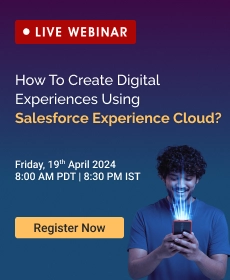Complete Guide To Salesforce Marketing Cloud Implementation
Table of Contents
Thanks to unique marketing tools, robotics, artificial intelligence, and the Internet of Things (IoT), marketing is undergoing a revolution. As a result, the overall customer experience businesses provide is being enhanced. Salesforce recognized this need and acquired ExactTarget in 2014, later introducing it as Salesforce Marketing Cloud, a comprehensive marketing solution for all types of businesses.
Intelligent marketing is not just about marketing plans and tactics but also customer success. Businesses require a platform with multi-channel capabilities to manage the seamless engagement of customers throughout their journey.
Salesforce Marketing Cloud is designed to integrate seamlessly with other Salesforce products, such as Sales Cloud, Service Cloud, and Commerce Cloud, allowing for the smoother management of CRM data.
This Salesforce Marketing Cloud Implementation guide can help you unlock a multitude of benefits for your business by utilizing the features of SFMC.
What is Salesforce Marketing Cloud?
Salesforce Marketing Cloud, previously called ExactTarget, is a platform with numerous marketing tools designed to provide customers with the best experience at every touchpoint.

This dynamic cloud is considered the most powerful marketing platform that brings all the marketing channels into one place. By connecting all data sources and devices, marketers can enable data-driven marketing and reduce human intervention in creating personalized content for each customer.
It is capable of the following:
- Creating a comprehensive view of customer data by connecting various data sources, channels, and devices.
- Making every interaction meaningful and synchronized through Einstein’s data and artificial intelligence.
- Curating real-time engagement personalized to the customer’s preferences and making it two-way communication for marketers and customers.
- Measuring, enhancing, and analyzing the impact of marketing efforts and customer loyalty.
Salesforce Marketing Cloud Features
Salesforce Marketing Cloud is armed with several features that boost current digital marketing activities:
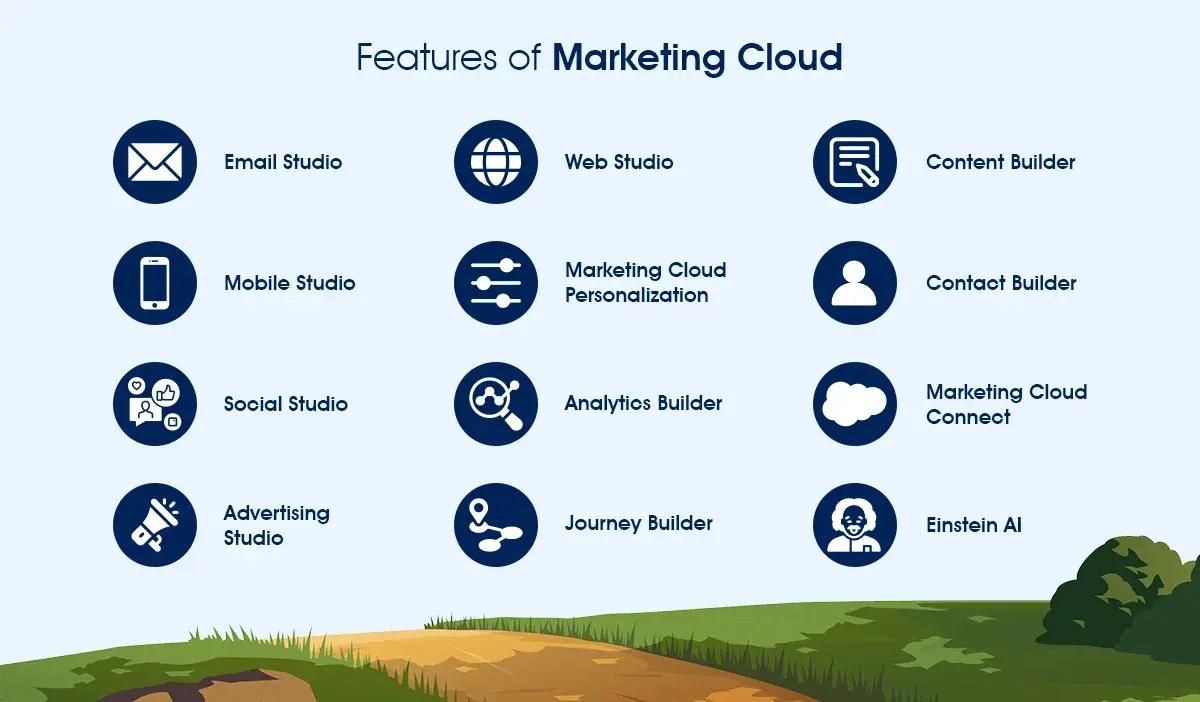
1. Email Studio
Email Studio is a powerful tool that enables teams to succeed through email marketing. By providing one-to-one messaging with potential audiences, Email Studio helps to execute successful email marketing campaigns. Its drag-and-drop segmentation allows companies to filter the profiles of prospects quickly. Email Studio sends personalized emails to potential customers, making it easy to convert them into buyers. By utilizing the capabilities of Email Studio, you can also track the details of emails sent and take the next best action accordingly.
2. Mobile Studio
With this studio, you can create content for mobile devices, such as crafting messages for SMS, MMS, and push notifications. You can send information to customers as soon as they are near your store and use Group Connect to drop messages via messaging apps, including Facebook Messenger and the Line Mobile Messaging App. Mobile Connect allows you to create, send, receive, and track SMS and MMS messages.
3. Social Studio
With Social Studio, you can manage, schedule, create, and monitor social media posts all in one place, thanks to its complete social media management solution. The platform’s unified interface enables you to organize posts by brand, region, or multiple teams and individuals with ease, while its powerful real-time publishing and engagement features make it an essential tool for content marketers.
Moreover, Social Studio provides comprehensive analytics of content performance by social network and time frame, enabling you to analyze channel and content performance in one interface. This feature allows you to stay on top of current trends and recommend new content ideas. The platform’s customizable team-based collaboration platform further enhances collaboration among team members, ensuring efficient social media management tasks.
4. Advertising Studio
Marketing Cloud’s Advertising Studio is a comprehensive solution that allows businesses to manage advertising campaigns across multiple channels, including social media, mobile, sales, and customer service. This platform enables users to enhance their email marketing goals and engage with their existing customers while reaching new prospects through various advertising options.
Advertising Studio’s essential features include activating CRM data for targeted campaigns, creating integrated campaigns with Journey Builder, and connecting leads in real-time with Lead Capture. Overall, Advertising Studio provides a powerful set of tools for businesses to manage their advertising efforts effectively.

5. Web Studio
The Web Studio provides tools that enable teams to design visually appealing and interactive web pages and create personalized customer content experiences. Marketers can monitor customer engagement on their landing page in real-time and gain valuable insights. Web Studio also allows for the seamless integration of landing pages with the customer journey.
6. Marketing Cloud Personalization (formerly Interaction Studio)
Interaction Studio allows personalized interactions with every visitor, existing and prospective customers based on their preferences and behaviors. Businesses can create tailored marketing strategies and improve customer service by tracking customers’ digital behavior, such as browsing patterns, activity times, interests, and past purchases.
7. Analytics Builder
This tool provides insights into customer data through various reporting formats, including bar graphs, pie charts, and scatter plots. The Email Analytics and Reporting feature also includes information on email marketing campaigns, such as open rates, click-through rates, and unsubscribe rates. It also generates reports for the channels available in the marketing cloud.
8. Journey Builder
Journey Builder facilitates the creation of a comprehensive plan to provide customers with a seamless experience through various interaction channels such as web, email, phone, or advertisements. This tool helps marketing teams build personalized customer relationships by identifying key moments in their journey. By analyzing customers’ browsing habits, preferences, shopping behavior, expectations, and purchase history, Journey Builder allows for tailored communication and messaging.
9. Content Builder
Content Builder is a tool that enables easy creation, and management of content across all digital platforms from a single location. Its intuitive drag-and-drop content blocks help save time and create professional-looking emails without requiring HTML knowledge.
10. Contact Builder
It allows users to easily access contact data and relationships, streamlining data usage. This feature also enables users to manage, organize, consolidate, and link data from various sources, including external ones such as ERP, CRM, and Point-of-Sales (POS) systems. Additionally, it displays all customer interactions with the brand, which helps marketers personalize customer conversations.
11. Marketing Cloud Connect
Marketing Cloud Connect is a powerful tool that integrates the digital marketing capabilities of Marketing Cloud with Salesforce CRM. This integration allows businesses to create more personalized customer relationships that are driven by data and automation.
Marketing Cloud Connect enables businesses to access Marketing Cloud tools directly within Sales or Service Clouds, creating a seamless experience. This tool helps maintain consistent branding and messaging while engaging customers in relevant conversations, driving more sales and engagement.
12. Einstein AI
Salesforce Marketing Cloud Einstein has emerged as an AI-powered tool and a game-changer for people concerned with analytics and decision-making. By converting data into valuable insights, it identifies and helps the sales team with lead nurturing & conversion. It also empowers users to maximize the tools in Email Studio and focus on high-conversion email lists. Einstein creates segments based on individual behaviors, enabling customized content for specific audiences or subscribers. Furthermore, it studies user actions and generates a report indicating what is and isn’t working in your favor, enabling you to refine your email marketing and messaging approaches to achieve desired outcomes.
Why Businesses Should Consider Getting Salesforce Marketing Cloud?
First, answer these questions:
- Are you prepared to meet the subsequent demands of your customers?
- Does your business possess the necessary tools to manage and track all events and engagements from a single location?
- Can your marketers measure their campaigns’ impact and effectiveness in reaching potential customers?
- Are your marketing teams equipped with intelligent tools for content and landing page customization or the creation of static templates?
- Are you able to efficiently track your marketing and sales funnels globally?
If you answered “no” to any of these questions, then SFMC Implementation can help you overcome these challenges. Read on to discover how it can address these situations.

Take note of the following information to understand why more and more businesses are choosing Salesforce Marketing Cloud and why it is expected to continue growing in the years to come:
- In 2022, SFMC achieved an impressive 23.9% market share, surpassing its closest competitor Microsoft, which only attained 5.5%.
- According to a recent in-depth research report, the Marketing Cloud market is expected to reach a valuation of approximately USD 19.8 billion by 2030, based on platform, solution, and end-user.
- Additionally, the market for Marketing Cloud is projected to grow at a compound annual growth rate (CAGR) of over 8.90% during this period.
- Some of the top customers of Salesforce Marketing Cloud include Adidas, American Express, Bose, Kellogg’s, Maersk, Marriott, PlayStation, Spotify, Toyota, TicketMaster, Zurich NA, and many more.
How To Implement Salesforce Marketing Cloud?
Here is the Salesforce Marketing Cloud Implementation Guide that you can refer to get started:
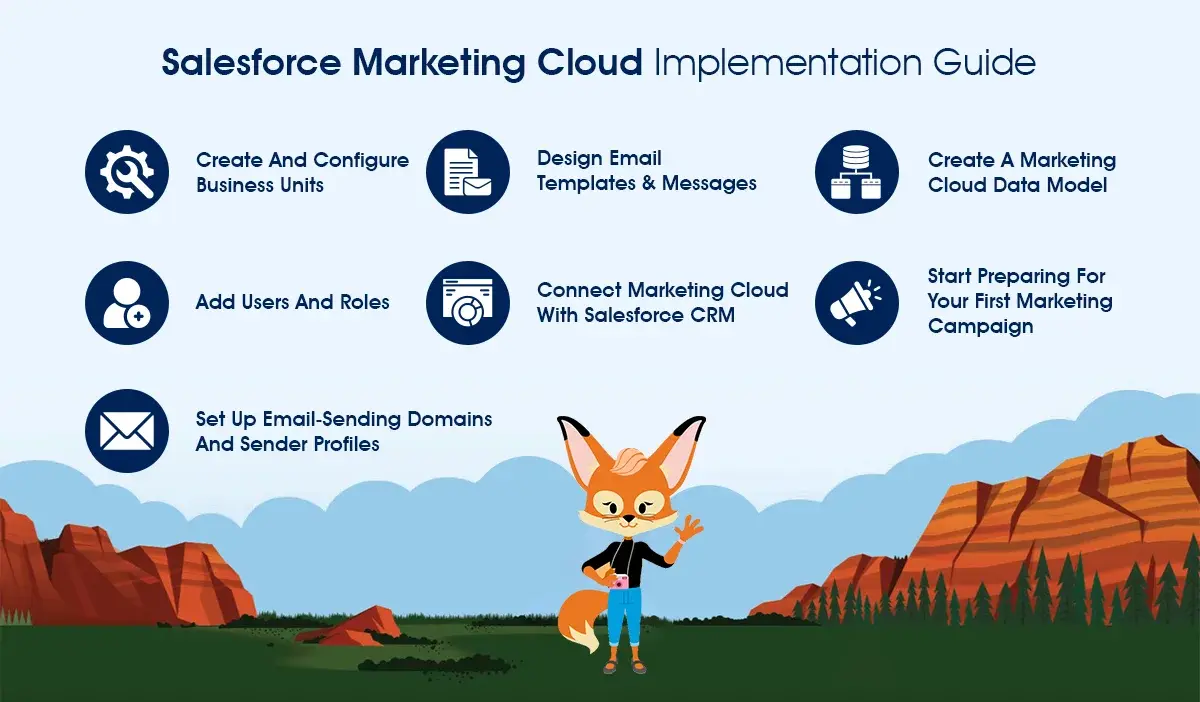
1. Create And Configure Business Units
Business Unit is a separate account within Marketing Cloud facilitating email campaigns and marketing activities. Users can create several business units to manage different brands or regions efficiently. In a business unit, all items created within it can be accessed by the users. If you want to share these items with users in other business units, you can do so by placing them in a shared items folder located in the Content and Subscribers sections of the application.
2. Add Users And Roles
Create users for your marketing team and stakeholders who need access to the salesforce marketing cloud and assign them the correct roles and permissions along with the correct business units.
3. Set Up Email-Sending Domains And Sender Profiles
It is necessary to configure the email-sending domains and Sender Profiles before you send the emails. Sender profiles or from addresses are created using email-sending domains in the marketing cloud to send out emails. These profiles determine the name and email address from which the emails will be sent, and they will be visible to the customers who receive or view the emails. In other words, the sender profile sets the name and email address that customers will see when they receive an email sent from the marketing cloud.
4. Design Email Templates & Messages
Email Templates are reusable designs that you can use for different email campaigns. Marketing Cloud allows you to create email templates and messages from a Drag-and-drop editor, and an HTML editor, or you can also import the existing templates. Creating email templates saves you time and maintains steadiness in your email campaigns. You can create highly personalized emails in marketing clouds.
5. Connect Marketing Cloud With Salesforce CRM
Connect Salesforce CRM with SFMC by configuring the marketing cloud connect package in Salesforce CRM to integrate both platforms. If you’re using both the Marketing Cloud and Salesforce CRM, you can create a connection between the two platforms. This connection allows you to sync objects and their associated data from the Marketing Cloud to Salesforce. In addition, the connection can also send important data, such as email opens, clicks, bounces, unsubscribes, etc back to Salesforce CRM. By establishing this sync, you’ll be able to streamline your marketing efforts and gain valuable insights into your customers’ behavior, all while keeping your data organized and up-to-date.
If you are also looking for reasons why should you choose Salesforce CRM, then this blog might help you.
6. Create a Marketing Cloud Data Model
Data extensions are the primary way to store data within the salesforce marketing cloud. Create data extensions and relationships between them to leverage the data model for your business processes. Data extensions will store email addresses, customer details, and other relevant information.
7. Start Preparing For Your First Marketing Campaign
Create automation and journey for designing personalized customer journeys across multiple channels. Automation and journey builders are the drag-and-drop interface that guides formulation and automation marketing strategies.
It is recommended to either hire a remote Salesforce Marketing Cloud Consultant or hire a Salesforce Implementation Partner to guide you in implementing and automating marketing strategies on various channels.
Salesforce Marketing Cloud: Use Cases
Check out how it can leave impactful imprints on the marketing approaches of a business and enable them to attract more customers:

Case: Invasive Marketing Approaches & Road-Blocks In Getting More Audiences
This business deals in Travel planning and management, majorly in the US, Canada, and Europe. Their website lists all their travel packages, including travel destinations, transportation facilities, accommodations, and other essentials.
They were planning to incorporate numerous marketing strategies to get into the eyes of more and more customers, but due to weak planning and scarcity of resources, it wasn’t happening.
Challenges Faced
- Difficulty In Reaching Potential Customers – It is crucial to target and reach out to potential customers to generate more business, expand the scope of business, and sell more travel packages that were not possible with their current system; their customers were spread over the US, Canada, and Europe.
- Lack of Personalization for End-users – They failed to provide a personalized experience to each customer, which impacted their customer retention rate. There was a high need for a tool that allowed them to curate customer-oriented and corresponding customized experiences.
- Trouble getting started with Social Media Marketing – With customers mostly spending time on Social Media channels, it was the best call to start marketing on social media handles. It was one effective way to generate new business leads and mark their market presence.
- Need for updating Marketing Approaches – The marketing approaches they were practicing were becoming obsolete and stopped driving the expected results for their business. They must now focus on creating purposeful marketing strategies to grow their business and enhance their prospects.
- Inability to understand customers and extract meaningful insights from collected data – Analyzing customer behavior is crucial for determining what services should be delivered and how they should be delivered. However, the team encountered difficulties processing the data they had collected and driving meaningful decisions from them.
Utilizing customer feedback requires skill in drawing valuable insights and developing strategies based on those insights. Additionally, sifting through large amounts of data can be a daunting task.
You can also check in detail how Salesforce Marketing Cloud Can Solve Major Marketing Challenges.
Solution Offered
To resolve these problems, different capabilities of Salesforce Marketing Cloud are necessary. Find below the specific functionalities that addressed each issue.
- Better outreach to the audience with a Personalized experience – For more personalization, Marketing Cloud Journey Builder is the marketing automation for creating and managing personalized customer journeys. Marketers can design and executive multi-step campaigns based on the interactions and behavior of specific customer segments. It helped their teams determine the touchpoints and interactions to revert to customers proactively. Additionally, Journey Builder empowers in developing personalized relationships with customers and expands scalability.
You can also read here How to Get the Most Out of Marketing Automation.
- Starting with Social Media Platforms – For management of Social Media channels, Marketing Cloud has Social Studio. This tool is capable of managing every sort of activity taking place on social media handles. Activities like analysis of social media conversations, understanding customer sentiments, engaging with the audience by responding to their stories, posts, and videos, and letting them know about their business is managed through Social Studio.
- Well-planned marketing moves – Email Studio is suitable for nurturing customer relationships and building long-lasting connections. It empowers you to design and personalize emails, maintain email lists, automate emails, and track how delivered emails are performing.
Moreover, the AI capabilities of Email Studio allowed marketers to develop intelligent, target-specific, and dynamic email campaigns. It improves customer engagement at the individual level and promotes the brand in the industry. - Effective Study of Customer Feedback and Deriving Meaningful Insights – Interaction Studio and Analytics Builder are the perfect tools for specifically achieving this purpose with SFMC. On one side, Interaction Studio helped them visualize, track, and micro-manage each customer’s experiences and deliver content related to their interest.
On the other side, the implementation of Analytics Builder shares essential insights into customers’ activities. This allows them to decide when and what steps they should take to witness a decline in turnover rate.
You can achieve successful marketing outcomes with its robust functionality. It enables effective planning and execution of strategies that drive high conversion rates.
However, given its complex nature, businesses should use certified Salesforce Implementation services rather than attempting to implement it independently. This approach can help them harness the full potential of Marketing Cloud and access its myriad advantages to enhance their marketing initiatives.
Salesforce Marketing Cloud Pricing
Salesforce is quite diverse when it comes to posing pricing. It has categorized Marketing cloud pricing as per purpose and features.

Businesses can pay further to avail of additional benefits according to their requirements, such as –
- Unification and connecting data to promote personalized interactions;
- Building strong connections with data-driven advertising;
- Measure, analyze, and track all the marketing efforts;
- Cater personalized yet relevant interactions to all the customers, etc.
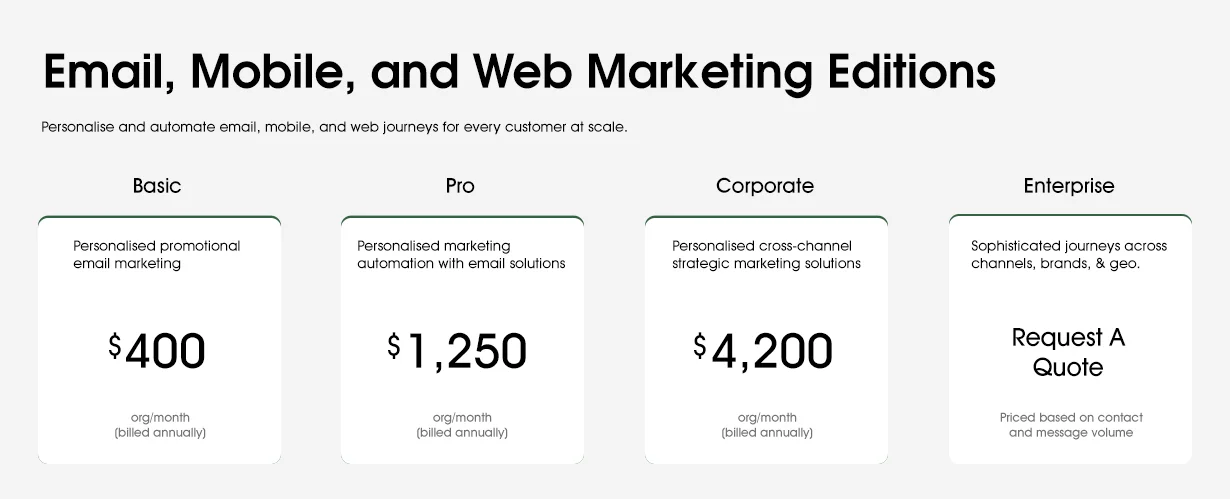
In this plan, some prominent Salesforce Marketing Cloud features are present, like Email Marketing, Content Creation, Integration with Salesforce Sales Cloud, Journey Builder, Mobile Messaging, Einstein AI Capabilities, and Management of multiple businesses.
Start with the Basic and Pro plan that brings only a few above-mentioned features. If you opt for a Corporate or Enterprise plan, you can enjoy various other functionalities and drive marketing-oriented results.
Here is how we helped MYMC through integration with Salesforce Clouds for business growth.
Why Is Salesforce Marketing Cloud The Best Solution Out There?
Multiple reasons make SFMC the best solution for all businesses. Some of the benefits are:
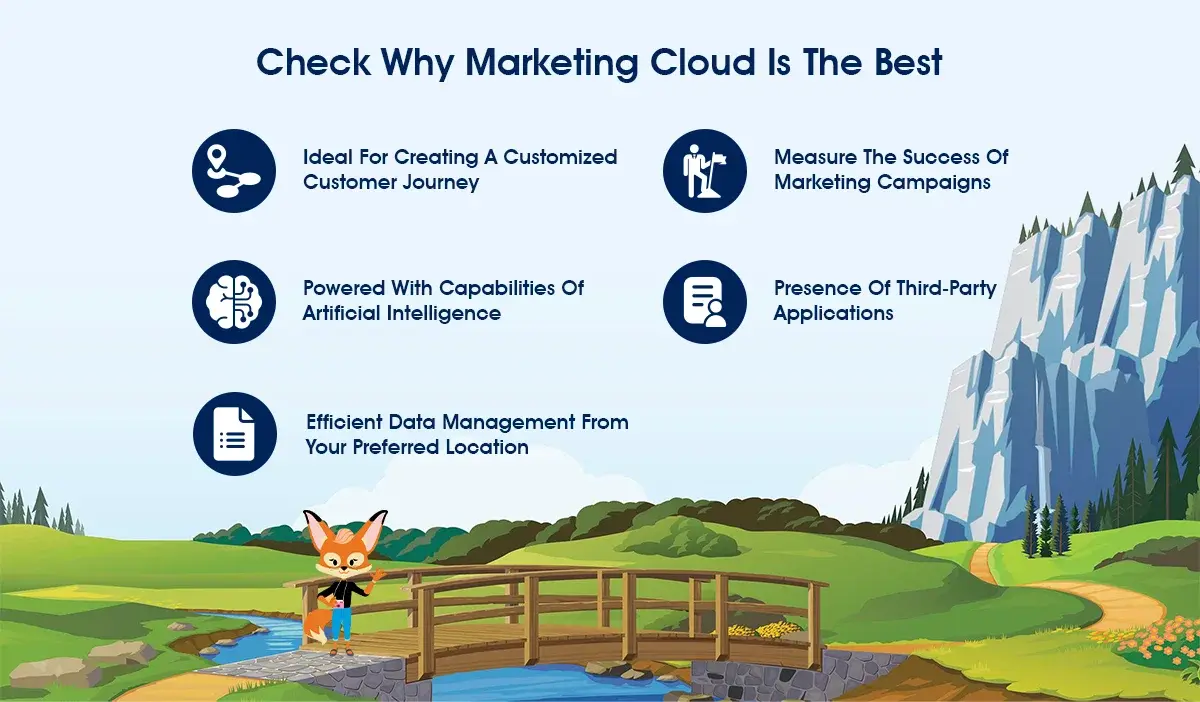
1. Ideal For Creating A Customized Customer Journey
Every customer interaction can be personalized by utilizing the capabilities of this Cloud and creating a customer journey that leaves imprints of the brand at every touchpoint. Personalized touchpoints should be strategically planned while planning out the marketing journey. It also augments the usage of data and functionality in the Marketing Cloud.
2. Measure The Success Of Marketing Campaigns
The platform simplifies the tracking of marketing campaign impact. It enables the measurement of delivery rates, open rates, click-through rates, bounces, unsubscribes, etc. Managers can evaluate the effectiveness of marketing efforts and assess the campaign’s ability to bring in more customers. It also offers techniques to enhance brand reputation and strategies to foster customer loyalty.
3. Powered With Capabilities Of Artificial Intelligence
Salesforce has incorporated Artificial Intelligence into its ecosystem through the introduction of Einstein. In Marketing Cloud, a series of applications that manage various engagement areas, such as time optimization for sending text messages to customers and frequency of engagement, are available. Artificial Intelligence enables the creation of personalized experiences, which reduces the likelihood of customer disengagement from the brand.
4. Presence Of Third-Party Applications
One primary objective of bringing this cloud into the market is to enhance marketing capabilities and customize business goals to deliver tailor-made experiences. Various third-party applications, available on Salesforce AppExchange and external sources, can meet customer requirements and cater exception services.
Moreover, Salesforce AppExchange is not the only place where you can find tools to enhance the value of SFMC. Salesforce Development Company has also there who have created products to escalate the functionality of Marketing Cloud.
Apart from the AppExchange, other third-party products from Salesforce Integration Partners can integrate with SFMC and enhance the functionality and value.
5. Efficient Data Management From Your Preferred Location
Using Journey Data and Contact data, anyone can assess the different phases of the Customer’s journey. It entails customers’ interactions with the brand with each communication. This data facilitates personalized communication at the right time and evaluates customer engagement. Campaign performance analysis also takes place efficiently when you have updated data on your side.
Apart from this, users can access Salesforce Marketing Cloud from any location and any device they prefer to work.

The Closing Words
Throughout the blog, you must have encountered the term “Salesforce Implementation Partner or Salesforce Development Partner”.
Well, it’s not the only option you should go with for successfully implementing Salesforce Marketing Cloud. There is one more way through which your team can get their hands on its capabilities.
Hire remote Salesforce developers who are well-versed in utilizing the functionality of this ultimately powerful Cloud. They will fully-fledged work on your project by outlining and working across a detailed technical specification.
There are various Salesforce Implementation Partners equipped with Marketing Cloud Experts. They deploy their experts to specific small projects on different hiring models, allowing businesses to pick the one that suits their budget the best.
However, hiring a remote Salesforce developer can be a time-consuming process and not without its challenges.
Though it’s the decision-making time, why not call our experts, who would be delighted to help you strategize your marketing efforts?
Book a call today!!
Don’t Worry, We Got You Covered!
Get The Expert curated eGuide straight to your inbox and get going with the Salesforce Excellence.
Frequently Asked Questions
Salesforce Marketing Cloud is a cloud-based digital marketing automation platform that allows businesses to create and manage personalized customer journeys across email, mobile, social media, and other digital channels.
Salesforce Marketing Cloud offers many features, including email marketing, mobile messaging, social media marketing, advertising, customer data management, analytics, and automation.
Businesses use Salesforce Marketing Cloud to create, manage and optimize activities like cross-channel campaigning, email, social media, mobile, web marketing, etc. Companies can easily connect with their customers in a personalized way and track their engagement, preferences, and buying patterns across all touchpoints.
Salesforce Marketing Cloud implementation means the process of setting up a marketing cloud platform in an organization to fulfil their marketing-related requirements. It comprises tasks like campaign creation, audience segmentation, data integration, email automation & marketing and performance tracking.
